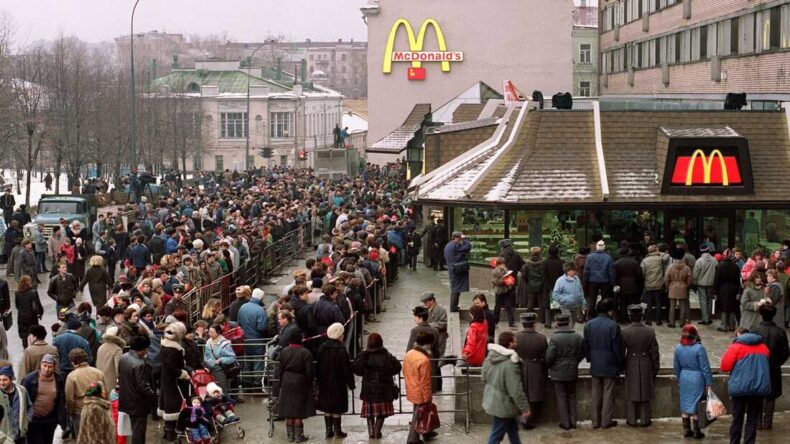McDonald’s has announced that it will depart Russia permanently after more than 30 years and has begun selling its stores.
The company’s 850 stores were temporarily shuttered in March.
The fast-food corporation stated that it decided due to the “humanitarian catastrophe” and “unpredictable operational environment” created by the Ukraine conflict.
In 1990, the inauguration of McDonald’s first restaurant in Moscow symbolised a thaw in Cold War hostilities.
A year later, the Soviet Union fell apart, and Russia’s economy was opened up to Western corporations. However, more than three decades later, it is one of many firms withdrawing.
“This is a hard subject with no precedent and deep ramifications,” said McDonald’s CEO Chris Kempczinski to employees and suppliers.
“Some could argue that employing tens of thousands of regular folks while giving access to food is unquestionably the correct thing to do,” he continued.
“However, it is hard to overlook the humanitarian disaster generated by Ukraine’s war.
And it’s difficult to picture the Golden Arches symbolising the same optimism and promise that drew us into the Russian market 32 years ago.”
In 1990, people waited in line to enter a freshly established McDonald’s on Gorky Street in Moscow.
When McDonald’s opened its first shop in Moscow’s Pushkin Square in 1990, there was a “feeling of exhilaration,” according to the BBC’s Russia reporter Steve Rosenberg, with people queuing for hours to try American burgers and fries.
He described it as “a symbol of freedom, of communism embracing capitalism, the Soviet Union embracing the West.”
Although McDonald’s had only temporarily closed its outlets, he claimed the company’s choice to sell them demonstrated that “things would not return to normal” and was a symbol of “Russia and the West heading on two very different paths.”
“So I believe we’ll see a lot more multinational corporations, global brands, decide to withdraw from the Russian market today formally,” he continued.

‘De-arching’
McDonald’s said that it would sell all of its locations to a local buyer and begin “de-arching” the restaurants, which entails removing the company’s name, logo, and menu. In Russia, it will keep its trademarks.
The firm stated that one of its top concerns was to guarantee that its 62,000 employees in Russia were paid until the transaction was finalised and that they have “future employment with any possible buyer.”
McDonald’s said it would write off up to $1.4 billion (£1.1 billion) in charges to finance the departure from its investment.
The action comes after Renault revealed plans to sell its operations in the nation.
The French company announced the sale of its 68 percent stake in Avtovaz to a Russian research institute, while its shares in Renault Russia would go to the city of Moscow.
Renault’s Russian assets have officially become state property, marking the first nationalisation of a major international firm since Ukraine’s invasion.
In 1990, when McDonald’s opened a store in Moscow, it was a hugely significant move: an American cultural icon setting up shop in the heart of the crumbling Soviet Union.
It is now becoming another global brand to leave the country as Russia’s war in Ukraine turns it into an international pariah.
McDonald’s “temporarily” closed its Russian outlets in March and now believes that staying in the nation would be inconsistent with its beliefs.
Cynics may point out that it only came to that decision after receiving some harsh criticism on social media for neglecting to speak out against the conflict in Ukraine.
Renault was likewise hesitant to forsake significant investments in Russia until Ukraine’s President Zelensky mentioned it in a speech to the French parliament.
Both companies have now succumbed to the inevitable.
And the heady days of Russia’s opening up to the rest of the world feel like a distant memory.
Russia and Ukraine contributed around 9% of McDonald’s global sales last year.
Due to the violence, the chain’s 108 locations in Ukraine remain shuttered, although the firm continues to pay total salaries to all of its employees there.
Before suspending operations in March, McDonald’s drew criticism for being hesitant to stop doing business in Russia, with some advocating for a boycott.
Other Companies in Russia
Since Russia’s February invasion of Ukraine, hundreds of worldwide companies, including Starbucks, Coca-Cola, Levi’s, and Apple, have fled or ceased operations in the country.
Other companies, such as Burger King and Marks & Spencer, claim they cannot close outlets due to complicated franchise agreements.
Read More : Where’s the beef? McDonald’s, and Wendy’s are sued over burger sizes












